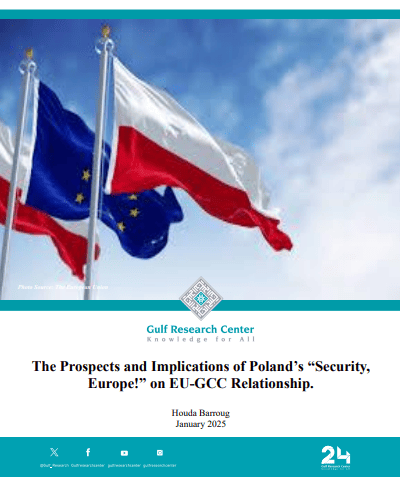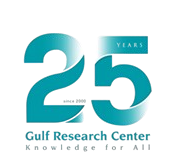
The Polish presidency of the EU Council in the first half of 2025 could prove to be a watershed moment for the European Union and its worldwide partners, including the GCC. The 6-month term falls under the motto "Security, Europe!" and promotes a diversified approach to security, strategic relationships, and economic resilience. As Poland becomes more involved in and engaged with EU affairs and Eastern Europe receives increased attention from the GCC and the global community, this approach fits with rising global concerns and opens up new opportunities for collaboration between the EU and its international allies.
Poland's EU presidency agenda focuses on a multifaceted security strategy that goes beyond traditional military issues. This strategy addresses internal and external security, economic resilience, cybersecurity, food security, public health, and energy independence. With this, Poland hopes to improve the EU's overall security stance in an increasingly complicated global environment. Moreover, the Polish presidency's emphasis on information security and countering disinformation contributed to a comprehensive vision of security in line with global problems and opened up new options for cooperation between the EU and its international partners.
Another aim of the Polish term is to foster a more inclusive and collaborative approach to research and innovation within the EU. A significant part of Poland's plan is to improve synergies between various EU funding sources for research and innovation to maximize the impact of EU investments. The presidency will emphasize the importance of innovation in boosting EU competitiveness and economic resilience, proposing measures to help entrepreneurs implement disruptive technologies, with a particular emphasis on artificial intelligence, quantum computing, and green technologies. Poland also supports the strengthening of European AI research and development institutes, acknowledging the growing role of AI in influencing the future.
The Polish presidency will also work to create a new EU energy security architecture to strengthen the bloc's energy security strategy. This effort is consistent with the overall goal of balancing decarbonization and economic stability. Poland's energy and climate policy will most likely highlight the importance of a just transition, which addresses the socioeconomic costs of energy transformation while supporting long-term solutions. This position creates chances for collaboration on energy infrastructure projects and collaborative endeavors in renewable energy technologies.
Poland will prioritize EU enlargement during its presidency, seeing it as strategic and essential for the bloc's long-term stability and prosperity. The Polish administration wants to speed up the accession process for the Western Balkans, Ukraine, and Moldova, viewing these nations as natural partners who can considerably contribute to the EU's economic and cultural diversity. Furthermore, Poland intends to enhance EU mission support for Ukraine in both the military (EUMAM Ukraine) and civilian (EUAM Ukraine) dimensions. The presidency will also aim to expand EU-NATO collaboration and enhance the complementarity between EU actions and those of NATO.
Taken together, the Polish EU presidency platform offers several opportunities to advance specific EU-GCC files, with energy security and transition being key areas for collaboration. Poland's focus on establishing a new EU energy security infrastructure is consistent with GCC objectives. This could help to improve the EU-GCC dialogue on sustainable energy options, particularly green hydrogen development. Joint investments in renewable energy technology could take place within the EU Global Gateway framework.
Economic partnerships can be strengthened by the president's emphasis on competitiveness and innovation. This could contribute to the revival of talks on the long-stalled EU-GCC Free Trade Agreement and open up new investment opportunities in industries such as technology and innovation.
In terms of innovation and digital transformation, Poland's emphasis on supporting disruptive technologies such as artificial intelligence and quantum computing is another field that is consistent with GCC countries' goals of diversifying their economy. This platform has the potential to strengthen EU-GCC ties in the digital economy and e-governance, as well as launch collaborative research and development projects.
On security issues, Poland’s presidency creates new opportunities for security cooperation. Building on the momentum of the first organized GCC-EU Regional Security Dialogue in Riyadh in January 2024, this platform has the potential to expand EU-GCC collaboration in cybersecurity and counterterrorism. The president's emphasis on countering disinformation creates a chance to share best practices and establish collaborative solutions in this crucial area.
Finally, the platform may promote coordination on regional stability measures in the Middle East, leveraging the EU's diplomatic weight and the GCC's regional clout. This is consistent with the Polish presidency's goal of preventing further escalation in the Middle East and stabilizing the situation in the region.
As such, the Polish EU presidency is an important platform for maintaining the momentum achieved during the October 2023 summit meeting. The approaching second structured GCC-EU Regional Security Dialogue and the EU-GCC Ministerial Meeting, both scheduled for the first half of 2025, provide concrete chances to put this collaboration into action. These platforms provide strategic venues for translating the presidency's broad strategy into concrete diplomatic and strategic efforts.
As the GCC members are looking to the EU to further capitalize on the diplomatic momentum, the Polish presidency serves as a platform for deeper, more meaningful engagement in the security, economic, and technological fields. By leveraging the existing milestones in the EU-GCC partnership and the ongoing strategic cooperation, both blocs can turn the broad strategic vision into tangible joint projects, particularly in areas of mutual interest like energy transition, digital innovation, and regional stability.
* Houda Barroug is a Researcher at the Gulf Research Center (GRC)

